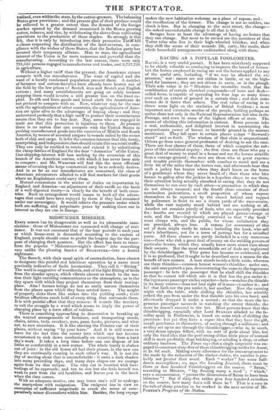RACING AS A POPULAR FOOLOMETER.
RACING is a very useful pursuit. It has been mistakenly supposed to be chiefly valuable as conducing to improve the breed of horses : but the horses employed in racing are not the horses applied to any of the useful arts, including, " if we may be allowed the ex- pression," war : racers are not ridden in battle, or on the high- road for business ; they are not driven in carts, or in the plough. Their sole value is to " illustrate the recondite truth, that the combination of certain chemical compounds—of bone and flesh— called horse, is capable of spreading its four legs so many times over such an extent of ground in a certain time ; and that some horses do it faster than others. The real value of racing is to throw some light on the statistics of British fooldom ; a most important and extensive section of the people, holding perhaps an undue share not only in the National Representation but also in the Peerage, and even in some of the highest offices of state. The means of eliciting this information is curious. Some persons take a real, enthusiastic, and delighted interest in ascertaining the proportionate power of horses to bestride ground in the manner mentioned. They fall apart in certain places yclept " Steward's stand" and so forth. The wisdom of that class is unquestioned. Others go from some general profession of desiring to see the race. There are four classes of these, three of which comprise the sub- jects of this statistical inquiry : the first class are those who pay a great deal of money to stand in a house and see the horses straddle from a vantage-ground ; the next are those who at great expense and trouble provide themselves with coaches to stand and see a little bit of the miles that the horses run, and afterwards hear that such a jockey has beaten whom they don't know on the horse of a gentleman whom they never heard of ; then those who hire horses to gallop after the jockies in a hopeless chace to see them, their attention being actually absorbed in seeing that they do not themselves be run over by each other—a precaution in which they do not always succeed ; and the fourth class consists of those numberless pedestrians, a small proportion of whom expose themselves to be squeezed by the crowd behind and rapped by policemen in front to see a dozen yards of the race-course, while the vast majority stand behind and see nothing at all. Another set consists purely of fools, who are especially provided for : booths are erected in which are played games—rouge et noir, and the like—ingeniously contrived so that "the bank" must always win, and the public, for whose satisfaction they are provided, always lose. A census (or nousensus) of this set of fools might easily be taken ; including the bank, who sell man's inheritance, not for a mess of pottage but for a swindled purse. All these classes are partly included in a very numerous one—those who risk a great deal of money on the striding powers of particular horses, which they usually know more about than about their owners. But the most remarkable set of fools are registered by the thimbleriggers. This game has become so celebrated, and it is so profound, that it ought to be described once a season for the benefit of new comers. A man stands beside a little table, whereon are three thimbles—common honest women's thimbles : under one, the said man putteth a pea, demonstrating the same to the ingenuous passenger : be bets the passenger that he shall shift the thimbles so that he cannot tell which one it is that has the pea under it : the ingenuous passenger smiles superior—bets—watches the thimble in its mazy course—does not lose sight of it once—touches it ; and to ! that hath not the pea under it, but another. Now the cunning wight with the table, while shifting the thimbles, has adroitly jerked the pea from under the first thimble into his own hand, and afterwards dropped it under a second ; so that the more the in- genuous passenger succeeds in watching the errant thimble, the more he doesn't succeed in the bet. Most persons know that this thimblerigging, especially after Lord STANLEY alluded to the fa- miliar sport in Parliament, is based on some trick of shifting the premises : but yet they have a vague idea that they have the gift, occult perchance to themselves, of seeing through a millstone ; and so they set up to see through the thimblerigger,—who is, in sooth, a very dense opaque fellow, with no sort of guile about him, but only the fixed idea that the performing of that little piece of manual skill is more profitable than bricklaying, or minding a shop, or other ordinary business. The Times says that a single carpenter was en- gaged to construct sixty-five of these t him blerigging-tables for Ascot, at 2s. 6d. each. Making every allowance for the encouragement to the trade by the reduction of the timber duties, the number is pro- bably not greater than usual. Each " worker" has some half- dozen accomplices ; so, says the Leading Journal, there must be three or four hundred thimbleriggers on the course. " Satan," according to MILTON, " lay floating many a rood " ; " which," says a commentator, " proves the dimensions of Satan to have been immense " ! But if sixty-five tables give four hundred swindlers on the course, how many foots will there be ? That is a sum in the rule of sharp practice to be worked in the next section of Mr. PORTER'S Progress of the Nation.


























 Previous page
Previous page